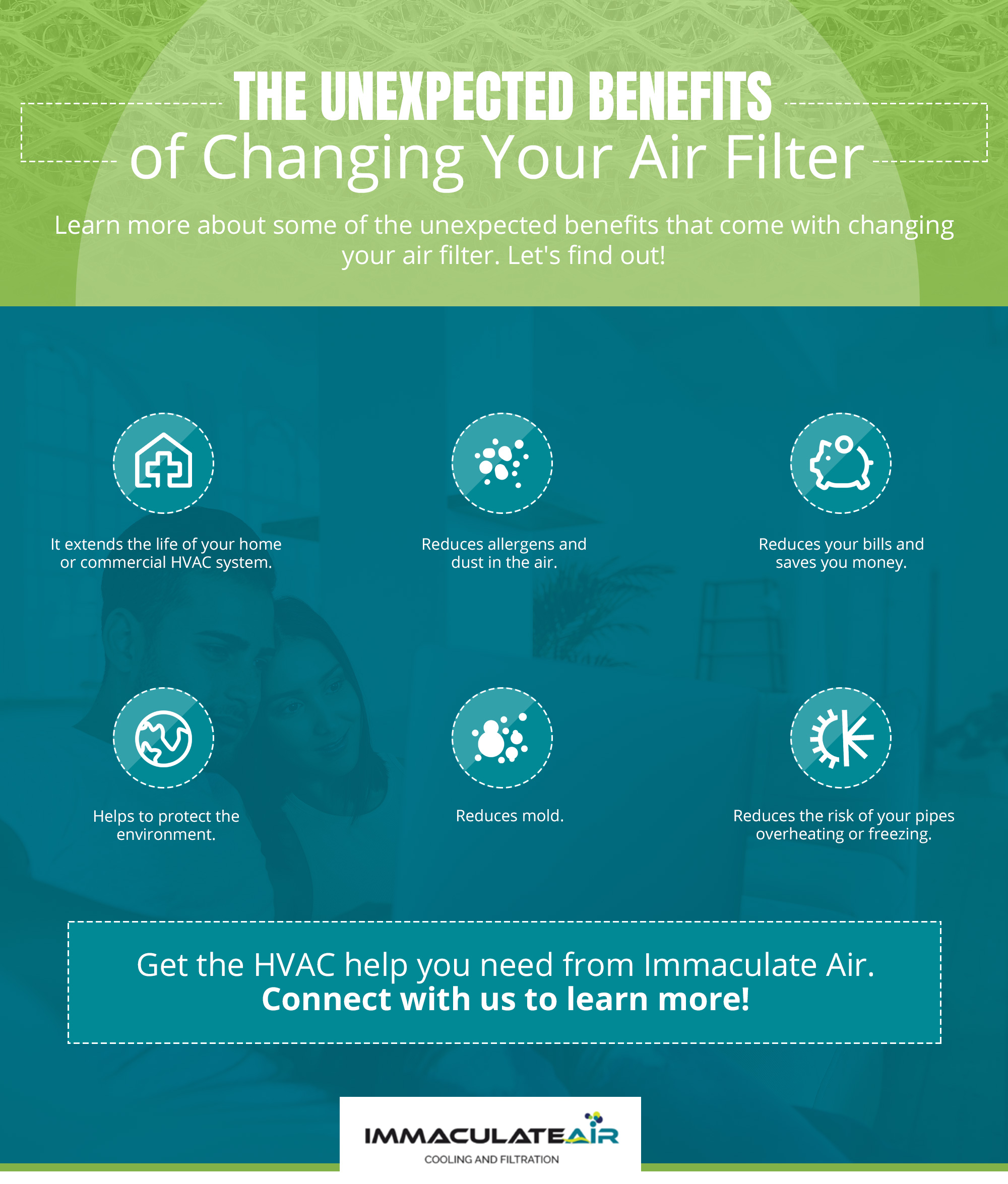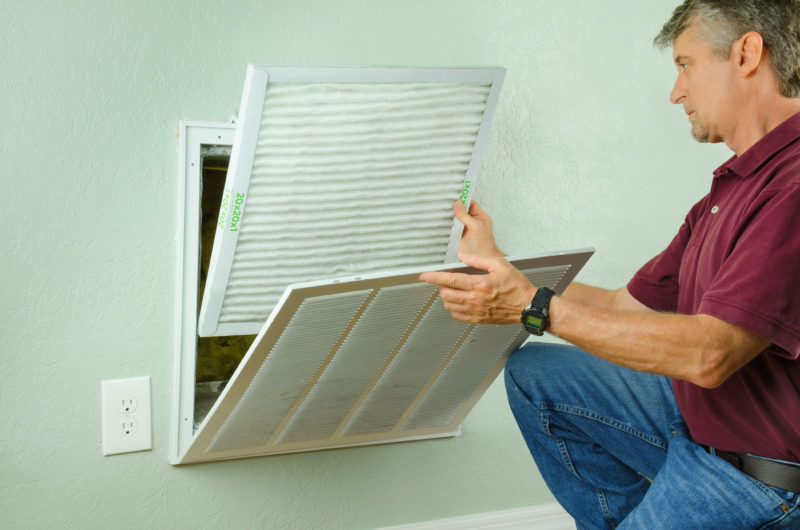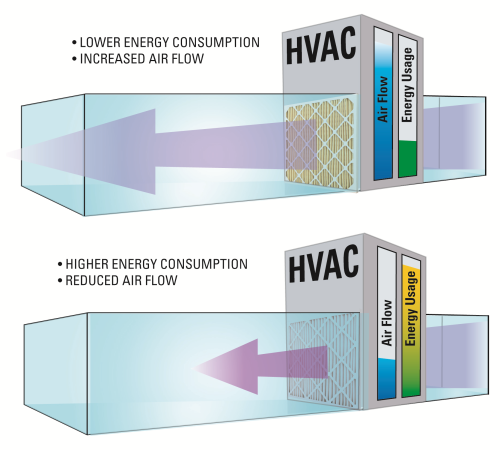Send us an email
Please enter your name and contact info.
Please enter your name and contact info.
Call Us Today! (850) 748-1066

Serving Families Throughout Pensacola
In the world of HVAC systems, one component that often goes unnoticed but plays a crucial role is the air filter. Air filters act as the first line of defense against airborne particles and pollutants, ensuring clean, healthy air circulation throughout your home or office. They not only improve the air quality but also help maintain the efficiency and longevity of your HVAC system. Discover the importance of air filters in HVAC systems and how they contribute to a comfortable and healthy environment for you and your loved ones.
Air filters are essential components of Heating, Ventilation, and Air Conditioning (HVAC) systems that help improve indoor air quality by capturing and trapping airborne particles. They are designed to remove dust, dirt, allergens, pollutants, and even odors from the air circulated by the HVAC system.
The primary role of air filters in HVAC systems is to protect the system and enhance indoor air quality. They prevent airborne particles from entering the HVAC system, thereby minimizing the risk of damage to its components. Additionally, air filters contribute to a healthier and more comfortable living environment by reducing allergies, respiratory issues, and unpleasant odors.
Clean air is crucial for maintaining a healthy indoor environment. HVAC systems equipped with air filters effectively remove contaminants, such as dust, pollen, pet dander, and mold spores, from the air. By doing so, they significantly improve indoor air quality, making the space safer and more comfortable for occupants.
Breathing in clean air can have a profound impact on your health. Airborne pollutants can trigger allergies, asthma attacks, and other respiratory conditions. By using air filters in HVAC systems, you can reduce the concentration of these harmful particles in the air, leading to healthier lungs and a decreased risk of respiratory issues.
Air filters play a crucial role in preventing respiratory issues caused by poor indoor air quality. With high-efficiency air filters, you can effectively capture and remove small particles, including bacteria, viruses, and other microorganisms, from the air. This helps prevent the spread of illnesses and ensures a safer living environment for everyone.
People with allergies and asthma can greatly benefit from the use of air filters in HVAC systems. These filters have the ability to trap common allergens like dust mites, pollen, and pet dander, significantly reducing their presence in the air. By minimizing exposure to these allergens, individuals with allergies and asthma can experience relief from symptoms and enjoy a healthier living space.
Air filters also help eliminate pollutants and odors from the air. They are able to capture particles like smoke, VOCs (volatile organic compounds), and cooking odors, ensuring that the air circulating in your home remains fresh and clean. This not only improves overall indoor air quality but also makes the environment more pleasant and inviting.

This image is property of immaculateairinc.com.
Air filters are designed to capture and trap airborne particles as air passes through the HVAC system. The filters consist of a fibrous material that creates a physical barrier, preventing these particles from circulating further into the system. This essential function ensures that only clean and filtered air is distributed throughout the space.
One of the primary functions of air filters is to remove dust and dirt from the air. As air is drawn into the HVAC system, the filters capture these particles, preventing them from settling on surfaces or being recirculated. By effectively removing dust and dirt, air filters contribute to a cleaner and healthier indoor environment.
Air filters are capable of filtering out microorganisms and allergens that can be harmful to your health. Bacteria, viruses, mold spores, dust mites, and pollen are some of the common allergenic and pathogenic particles that air filters can effectively capture and prevent from being released into the air. This filtration process ensures that your indoor air remains free from these potential health hazards.
Certain air filters, such as activated carbon filters, have the ability to filter out harmful gases and chemicals from the air. These filters contain a layer of activated carbon or charcoal, which acts as a sorbent for gases, VOCs, and odors. By incorporating activated carbon filters into your HVAC system, you can further enhance indoor air quality by removing these potentially harmful substances.
Air filters play a crucial role in maintaining proper airflow and system efficiency in HVAC systems. By capturing and removing airborne particles, they prevent these particles from clogging up the system components, such as the coils and fan. This allows the system to operate more efficiently, improving its performance and prolonging its lifespan.
Air filters serve as the first line of defense for HVAC system components. By capturing and filtering out particles, they prevent these particles from entering and potentially damaging important components, such as the compressor and the evaporator coil. Regularly replacing and maintaining air filters can help extend the lifespan of these components, saving you from costly repairs or replacements.
When airborne particles accumulate within the HVAC system, they can cause increased wear and tear on the system’s components. The presence of dust, dirt, and other contaminants in the system can hinder its performance and efficiency, leading to more frequent breakdowns or malfunctions. By using air filters and keeping them clean, you can reduce the workload on the system and minimize the risk of premature wear and tear.
Regularly maintaining and replacing air filters can help minimize the need for costly repairs to your HVAC system. A clogged or dirty air filter can impede the proper airflow, causing the system to strain and work harder to achieve the desired temperature. This additional strain can lead to various issues, such as motor failure or freezing of the evaporator coil. By ensuring the filters are clean and functioning properly, you can avoid unnecessary repairs and extend the life of your HVAC system.
A clean and well-maintained air filter contributes to the overall energy efficiency of an HVAC system. When the air filter is clogged or dirty, the system has to work harder to push the air through. This increased workload results in higher energy consumption and, consequently, higher utility bills. By regularly replacing and maintaining air filters, you can ensure that your HVAC system operates at its optimal efficiency, reducing energy waste and saving you money.
An important benefit of properly functioning air filters in HVAC systems is the potential for energy savings. When air filters are clean and allow for proper airflow, the system operates more efficiently. This improved efficiency leads to lower energy consumption, thereby reducing your monthly utility bills. By investing in regular maintenance and replacement of air filters, you can save both energy and money in the long run.
This image is property of lh6.googleusercontent.com.
Fiberglass filters are one of the most common types of air filters found in HVAC systems. They consist of a fiberglass material formed into a dense mesh, which captures larger particles like dust, pollen, and lint. Fiberglass filters are cost-effective and offer some basic filtration capabilities.
Pleated filters are more efficient than fiberglass filters, as they have a larger surface area for capturing airborne particles. These filters are made of polyester or cotton fibers that are pleated to increase the filtering capacity. Pleated filters are capable of capturing smaller particles like mold spores, pet dander, and fine dust, making them a popular choice for improving indoor air quality.
Electrostatic filters use an electrostatic charge to attract and capture particles from the air. These filters can be made from disposable materials or reusable washable materials. They are effective in capturing small particles, including allergens and microorganisms. Electrostatic filters are known for their high filtration efficiency but may require more frequent maintenance compared to other types of filters.
HEPA (High-Efficiency Particulate Air) filters are renowned for their superior filtration capabilities. These filters are highly effective in capturing microscopic particles as small as 0.3 microns in size, such as bacteria, viruses, and smoke. HEPA filters are commonly used in hospitals, laboratories, and other environments where air quality is critical. However, HVAC systems require specially designed units to accommodate the increased airflow resistance of HEPA filters.
Activated carbon filters are primarily designed to remove odors, gases, and chemicals from the air. These filters contain a layer of activated carbon or charcoal, which acts as an adsorbent for volatile organic compounds (VOCs), smoke, and other odorous substances. Activated carbon filters are often used in conjunction with other types of filters to improve the overall effectiveness of air filtration.
When choosing an air filter, it’s important to consider its filtration efficiency. This refers to the filter’s ability to capture different sizes of particles. The Minimum Efficiency Reporting Value (MERV) rating is commonly used to determine the filtration efficiency of air filters. Higher MERV ratings indicate better filtration capabilities, particularly for smaller particles.
Air filters come in various sizes, and it is crucial to choose a filter that fits your HVAC system properly. Choosing the wrong size can lead to air leakage around the filter, bypassing the filtration process and reducing its effectiveness. It is recommended to consult your HVAC system’s manual or seek professional advice to ensure the correct filter size and compatibility.
As mentioned earlier, the MERV rating is an important factor to consider when choosing an air filter. It provides a standardized measurement of the filter’s ability to capture and remove particles from the air. Higher MERV ratings indicate better filtration efficiency, but it’s important to check your HVAC system’s requirements and limitations, as some systems may not be compatible with filters of very high MERV ratings.
The lifespan of an air filter depends on various factors, including the quality of the filter and the level of pollutants in your environment. Some filters need to be replaced every month, while others can last up to six months or even longer. It is recommended to follow the manufacturer’s guidelines and periodically inspect your filters to determine when replacement is necessary.
Consider the cost-effectiveness of the air filter you choose. While filters with higher MERV ratings may provide better filtration, they may also require more frequent replacement due to increased particle collection. Balancing the filtration needs with the long-term cost of replacement filters is important to ensure both clean air and financial feasibility.

This image is property of www.delair.com.
Regular filter maintenance involves changing air filters at recommended intervals. The frequency of filter changes depends on several factors, such as the type of filter used, the level of pollutants in your environment, and the manufacturer’s guidelines. Neglecting to change filters can lead to reduced filtration efficiency, increased strain on the HVAC system, and compromised indoor air quality.
If you have reusable filters, it is important to clean them regularly to maintain their effectiveness. This typically involves rinsing the filter with water or using a vacuum cleaner to remove accumulated dust and dirt. Follow the manufacturer’s instructions for proper cleaning techniques to ensure the filters are thoroughly cleaned without causing damage.
Regular inspection of air filters is crucial to identify any signs of damage or wear. Damaged filters may not effectively capture particles and can potentially allow contaminants to circulate in the air. If you notice any tears, holes, or other visible damage to the filter, it is important to replace it promptly to maintain optimal filtration and system performance.
While some aspects of filter maintenance can be performed by homeowners, it is often beneficial to hire professionals for thorough filter maintenance. HVAC professionals have the expertise and knowledge to assess the condition of the filters, determine the appropriate replacement intervals, and perform any necessary cleaning or replacement procedures. Professional maintenance ensures that your air filters are properly maintained and functioning optimally.
One of the most common signs of a clogged or dirty air filter is restricted airflow. If you notice reduced or weak airflow from your HVAC vents, it may indicate that the air filter is clogged and inhibiting the proper circulation of air. Restricted airflow can result in inefficient cooling or heating, uneven temperature distribution, and increased strain on the system.
A clogged or dirty air filter can negatively impact the performance of your HVAC system. The system may struggle to reach or maintain the desired temperature, leading to discomfort and decreased energy efficiency. If you notice a decline in your system’s performance, it is worth checking the air filter to see if it needs cleaning or replacement.
When an air filter is clogged or dirty, the HVAC system needs to work harder to compensate for the reduced airflow. This increased workload results in higher energy consumption, leading to inflated utility bills. If you notice a sudden spike in your energy bills without any apparent explanation, a clogged air filter could be the culprit.
If you or your household members experience allergy symptoms, such as sneezing, coughing, or congestion, it could be a sign of a clogged or dirty air filter. When the filter is unable to effectively capture allergens like pollen, dust mites, or pet dander, these allergens can circulate in the air, triggering allergies and worsening symptoms.
A clogged air filter can contribute to unpleasant odors in your home. As the filter becomes overwhelmed with accumulated particles, it can no longer effectively remove odors from the air. This can result in stale or musty smells permeating your living space, reducing overall indoor air quality and comfort.

This image is property of www.filtsep.com.
Before replacing your air filter, gather the necessary tools and supplies. This typically includes a new air filter (compatible with your HVAC system), gloves (if desired), and a flashlight (for better visibility if needed).
The location of the air filter can vary depending on your HVAC system setup. Common locations include inside the air handler unit, in the return air duct, or in a filter grille. Consult your HVAC system’s manual or seek professional advice if you are unsure where to find the air filter.
Once you have located the air filter, carefully remove the cover or housing. Take note of how the old filter is positioned and remove it by sliding it out of its slot or lifting it up. Be cautious not to let any accumulated dust or debris fall into the HVAC system or surrounding area.
Insert the new air filter into its designated slot, ensuring it is positioned correctly according to any arrows or markings on the filter. Make sure the filter is snugly and securely in place to prevent air leakage around the edges. Replace the cover or housing, ensuring it is properly sealed.
Dispose of the old air filter properly. If it is a disposable filter, place it in a plastic bag to contain any dust or debris, then dispose of it in your regular household trash. If it is a reusable filter, clean it according to the manufacturer’s instructions before storing it for future use.
Air filters play a crucial role in HVAC systems by improving indoor air quality, protecting system components, and promoting overall health and comfort. They effectively capture and remove airborne particles, preventing respiratory issues and reducing allergies and asthma symptoms. Additionally, air filters remove pollutants and odors, enhancing the overall indoor environment.
Regular maintenance of air filters is essential to ensure their effectiveness and prolong the lifespan of HVAC systems. By following recommended replacement intervals, cleaning reusable filters, and inspecting for damage, homeowners can prevent expensive repairs, reduce energy consumption, and maintain optimal indoor air quality. Seeking professional assistance for filter maintenance can further enhance the efficiency and performance of HVAC systems.
Choosing the right air filter, considering factors such as filtration efficiency, size, MERV rating, filter lifespan, and cost-effectiveness, is vital for long-term efficiency and indoor air quality. Recognizing the signs of a clogged or dirty air filter, such as restricted airflow, reduced system performance, increased energy consumption, allergy symptoms, and unpleasant odors, allows homeowners to take prompt action in cleaning or replacing filters. By being proactive in air filter maintenance, you can ensure a healthier and more comfortable living environment for you and your family.

This image is property of www.conditionedairsolutions.com.